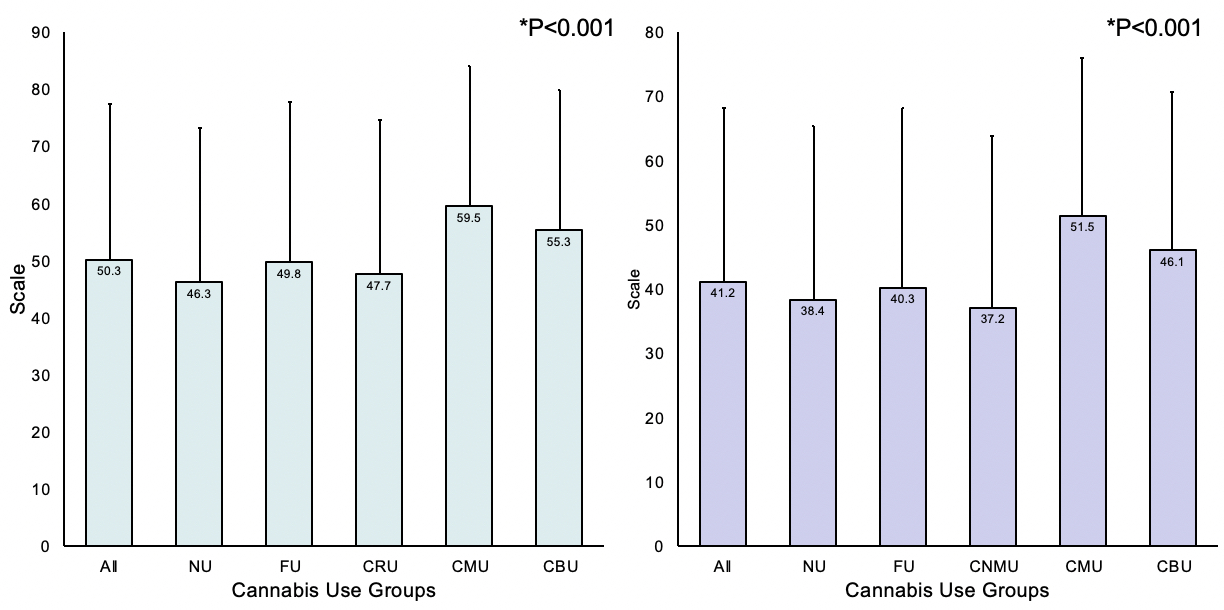Session Information
Session Type: Poster Session B
Session Time: 10:30AM-12:30PM
Background/Purpose: Approximately 12-20% of Rheumatology patients use cannabis (Fitzcharles 2020, Wipfler 2022, Rampakakis 2023). Despite the legalization of medical cannabis in California more than 2 decades ago (California Department of Justice), there is a paucity of data evaluating cannabis use patterns in rheumatology patients, and its effects on pain. This study aims to examine if there are rheumatology patient characteristics that differ based on cannabis use patterns and to evaluate cannabis’ effects on patient-reported pain scores in current cannabis users within California.
Methods: This cohort included patients ≥18 years of age, with active email addresses, and were seen in Rheumatology clinics in California between 12/3/19 to 12/2/22 (n=35,915). A REDCap survey was sent and a total of 2,733 responded for a 7.6% response rate. The cannabis survey consisted of demographics (age, sex, race/ethnicity, etc.), numerical pain rating scale (NPRS), rheumatologic medical condition, and cannabis use pattern (never users [NU], former users [FU], current non-medical users [CNMU], current medical users [CMU], and users for both non-medical & medical [CBU]). Participants reported efficacy of cannabis use on joint pain and overall body pain (range of 0-100 with 0 being very ineffective and 100 being very effective). One-way ANOVA and chi square tests compared demographics, pain scores, and effectiveness outcomes across cannabis use groups.
Results: The cohort consisted of 19% rheumatoid arthritis, 10% osteoarthritis, 9% systemic lupus erythematosus, 7% fibromyalgia, and smaller frequencies of other conditions. Twenty-six percent of participants were NU, 33% FU, 19% CNMU, 12% CMU, and 11% CBU, where 42% of the cohort were current cannabis users. The cohort was predominantly female (73%), white (62%), educated (74% college graduates), and employed (58% with job/student/homemaker). The mean age was 54 years. Differences were seen across cannabis use for age, sex, race/ethnicity, and employment (all p< 0.05), where CBUs were youngest (45.3 years), CNMUs had lowest proportion of females (67%), and CMUs had higher rate of whites (70%) and lowest rate of employment (52%).
Current NPRS (mean 41.2) was significantly different across the cannabis use groups (p< 0.001), where CMU reported the highest pain (mean 51.5, SD 25.9) (Figure 1). Among current cannabis users, 65% of participants used cannabis for joint pain and 49% for overall body pain. CMUs reported a mean efficacy 70.2 and 71.8 for joint pain and overall pain, respectively (Table 1). Similar findings were observed for CBUs.
Conclusion: Approximately 23% of survey participants reported current use of cannabis for medical purposes. Current cannabis users reported higher pain scores and a cannabis effectiveness of ~70 for joint pain and overall body pain. Future research is warranted to examine the impact cannabis has on the treatment of pain in rheumatology patients.
To cite this abstract in AMA style:
Hui M, Jackson N, Pham A, Chen K, Elashoff D, Cooper z, Ranganath V. Medical and Non-Medical Cannabis Use by Rheumatology Patients: A Study of over 2000 Patients in California [abstract]. Arthritis Rheumatol. 2024; 76 (suppl 9). https://acrabstracts.org/abstract/medical-and-non-medical-cannabis-use-by-rheumatology-patients-a-study-of-over-2000-patients-in-california/. Accessed .« Back to ACR Convergence 2024
ACR Meeting Abstracts - https://acrabstracts.org/abstract/medical-and-non-medical-cannabis-use-by-rheumatology-patients-a-study-of-over-2000-patients-in-california/


